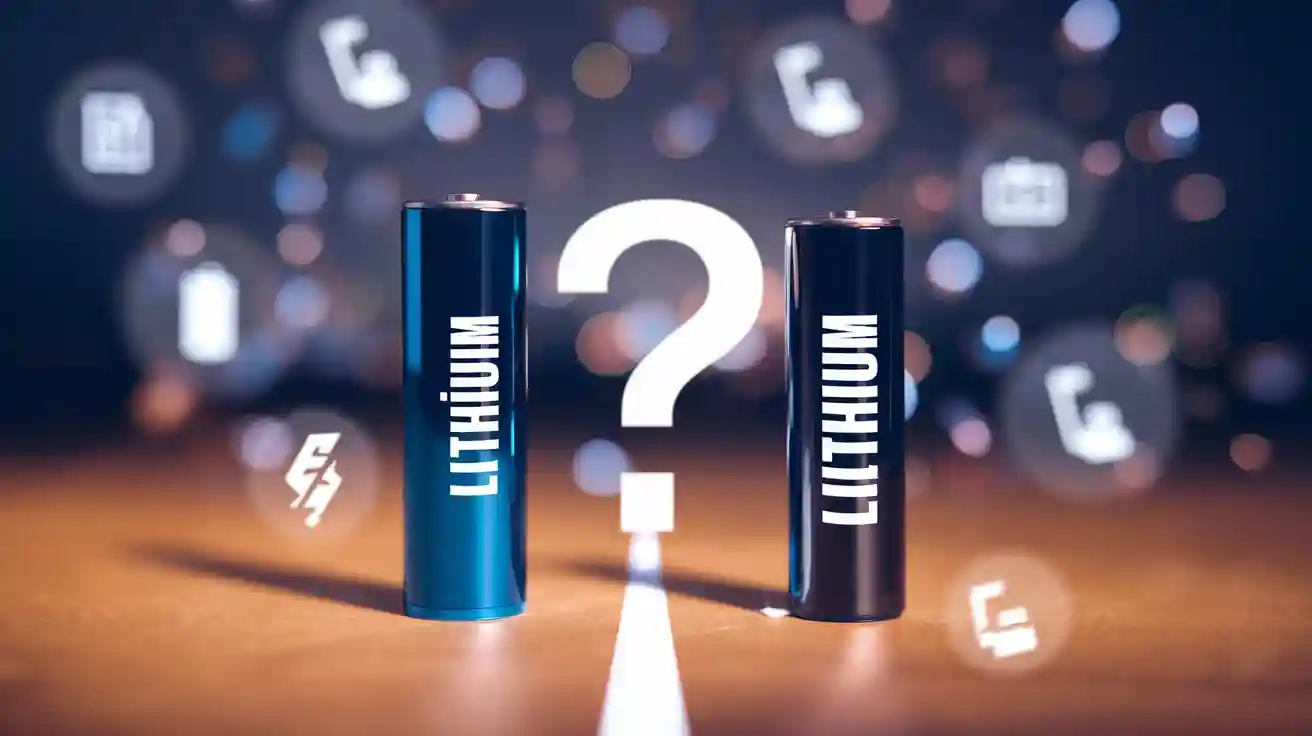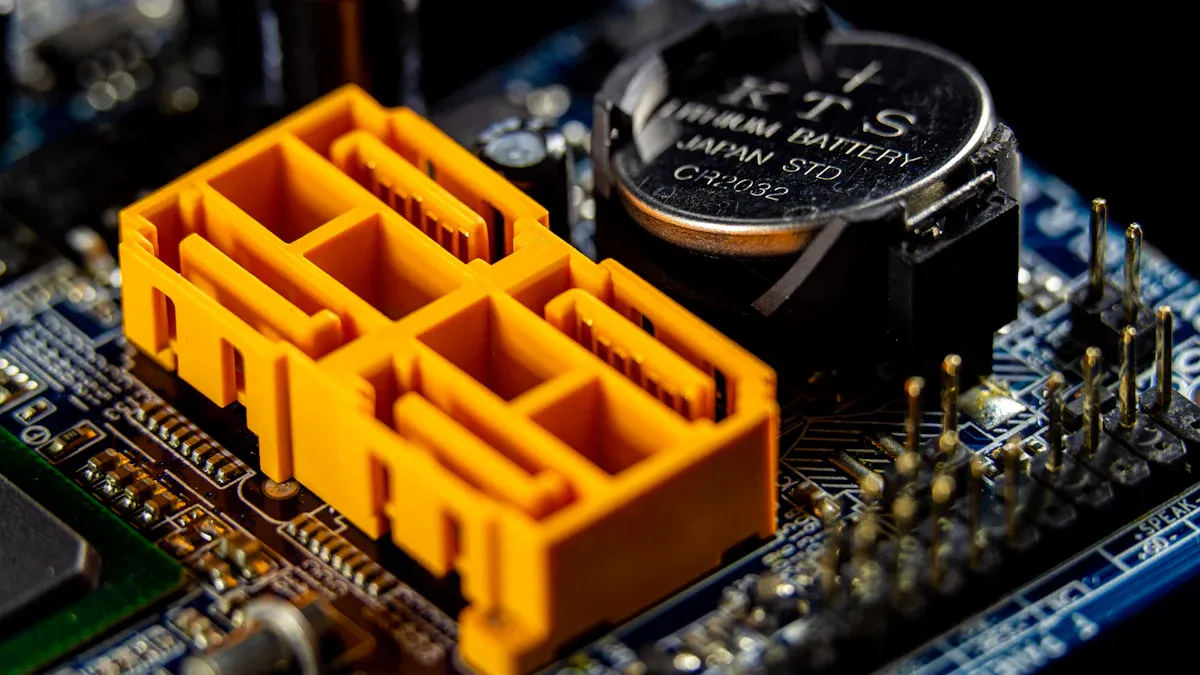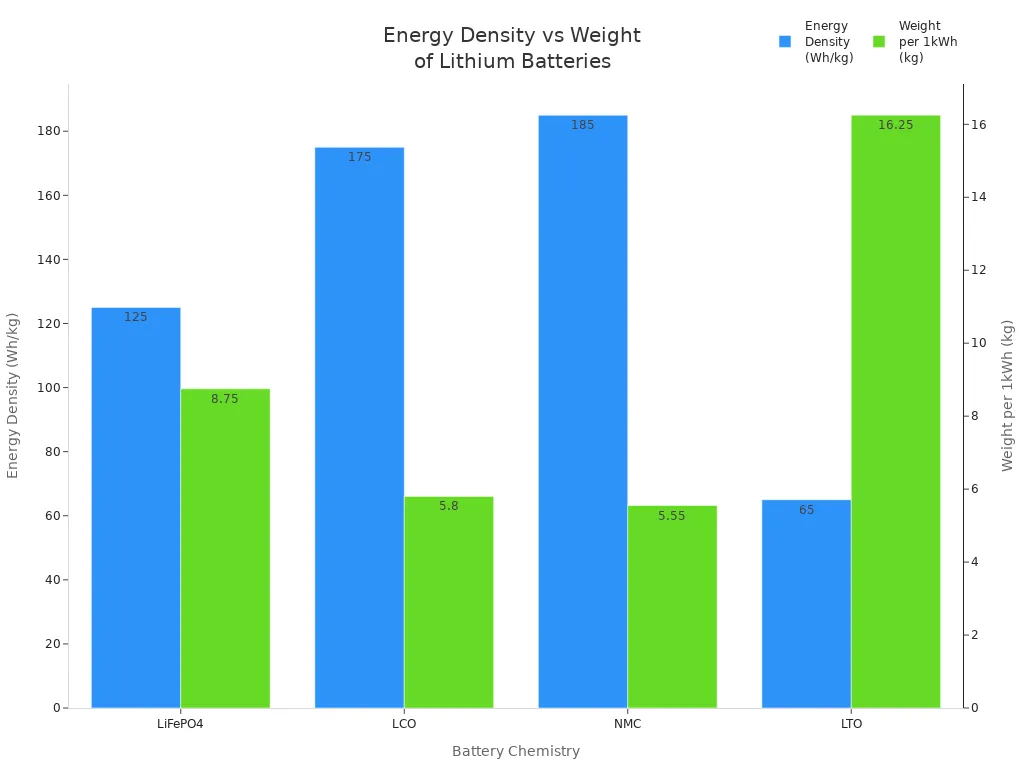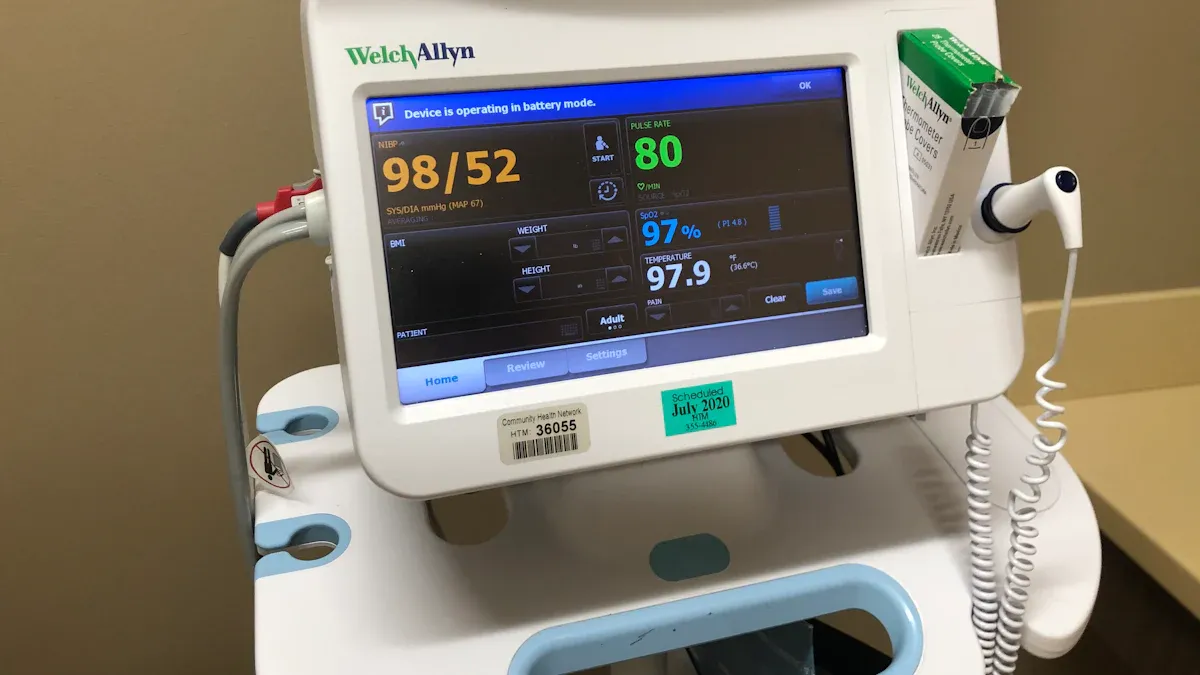
If you want a battery for single-use and long shelf life, choose lithium batteries. For devices you use often and need to recharge, pick Lithium-ion Batteries. The main difference is rechargeability. You can use lithium batteries in things like remote controls or smoke alarms. Lithium-ion Batteries work best in smartphones, laptops, electric vehicles, and other high-demand devices. This battery technology helps you get the most from your power storage solutions.
主要区别

Difference Between Lithium and Lithium-ion Batteries
You might wonder about the real difference between lithium and lithium-ion batteries. The main difference is that lithium batteries are single-use, while lithium-ion batteries are rechargeable batteries. You use lithium batteries once and then replace them. You can recharge lithium-ion batteries many times, making them a better choice for devices you use every day.
Here is a quick side-by-side comparison:
| 特点 | 锂电池 | 锂离子电池 |
|---|---|---|
| 可充电 | 没有 | 是 |
| 典型用途 | Single-use | Rechargeable |
| Anode Material | Metallic lithium | Lithium compounds and carbon |
| Internal Structure | Simple, single cell | Complex, multi-layered cells |
| 保质期 | Long | 中度 |
| Safety Mechanisms | Few | Advanced |
You find lithium batteries in devices like cameras, watches, and smoke alarms. Lithium-ion batteries power smartphones, laptops, and electric vehicles. The difference between lithium and lithium-ion batteries affects how you use and replace them.
化学
The chemistry inside each battery type sets them apart. Lithium batteries use metallic lithium as the anode. This metal is very reactive and cannot be recharged. Lithium-ion batteries use lithium compounds and carbon-based electrodes. These materials allow lithium ions to move in and out during charging and discharging.
Note: Lithium-ion batteries use a process called “intercalation.” Lithium ions slip into spaces in the graphite or lithium compound layers without changing the structure. This process helps prevent dangerous spikes and makes lithium-ion batteries safer and longer-lasting.
这里有一个 table showing the main chemical compounds in lithium-ion batteries:
| Chemistry Type | Main Cathode Compounds | Anode Material | 主要特点 |
|---|---|---|---|
| LCO | Lithium Cobalt Oxide (LiCoO2) | Graphite Carbon | High energy, small electronics, safety limits |
| LMO | Lithium Manganese Oxide | 石墨 | High power, stable, used in tools and e-bikes |
| LFP | Lithium Iron Phosphate | 石墨 | Safer, lower cost, used in cars |
| NMC | Nickel Manganese Cobalt Oxide | 石墨 | High energy, used in cars, less cobalt over time |
| NCA | Nickel Cobalt Aluminum Oxide | 石墨 | Very high energy, used in cars, often with NMC |
Lithium batteries have a simple design with pure lithium metal. Lithium-ion batteries have a more complex mix of materials, which gives them their unique features.
可充电
Rechargeability is a key reason why you might choose one battery over the other. Lithium batteries are not rechargeable. Once they run out, you must replace them. Lithium-ion batteries are rechargeable batteries. You can use them for hundreds or even thousands of cycles.
- Lithium-ion batteries can last for over 1,000 charge-discharge cycles.
- Rechargeability means you save money and reduce waste over time.
- Lithium batteries have a long shelf life but need frequent replacement if used often.
Rechargeable batteries like lithium-ion batteries also have built-in safety mechanisms and management systems. These features help control temperature, voltage, and charging, making them safer and more reliable.
寿命
Lifespan means how long a battery lasts before you need to replace it. Lithium batteries have a long shelf life. You can store them for years without losing much power. However, you can only use them once.
Lithium-ion batteries have a lifespan of about 300 to 500 full charge cycles, or 2 to 3 years. Some lithium-ion batteries can last even longer if you use only part of their capacity each time. Shallow charging can stretch the lifespan to thousands of cycles.
- Lithium batteries: Long shelf life, single use.
- Lithium-ion batteries: Shorter shelf life, but many uses due to rechargeability.
You should pick lithium batteries for devices you rarely use. Choose lithium-ion batteries for devices you use and recharge often.
安全
Safety is important when you use any battery. Both lithium batteries and lithium-ion batteries have risks, but the risks are different.
- Lithium batteries can catch fire if damaged or shorted. They do not have advanced safety mechanisms.
- Lithium-ion batteries have more risks, such as overheating, thermal runaway, and fire. These risks can happen if the battery is overcharged, damaged, or exposed to high temperatures.
- Lithium-ion batteries include safety mechanisms like temperature sensors and voltage regulators. These features help prevent accidents.
- Both types of batteries can be dangerous if not handled properly. You should always follow the manufacturer’s instructions.
Tip: Store batteries in a cool, dry place. Avoid crushing, puncturing, or exposing them to heat. Proper handling reduces risks and keeps you safe.
The difference between lithium and lithium-ion batteries in safety comes from their chemistry and design. Lithium-ion batteries have more built-in protections, but you still need to use them carefully.
锂电池与锂离子电池
能量密度
When you compare lithium batteries and lithium-ion batteries, you notice a big difference in energy density. Energy density tells you how much energy a battery can store for its weight. Lithium batteries often have a high energy density, which means they can hold a lot of power in a small package. This makes them perfect for devices that need to run a long time without recharging, like cameras or medical devices.
Recent studies show that advanced lithium-ion batteries can reach 超过 700 Wh/kg in specific lab conditions, but most commercial lithium-ion batteries offer about 200–300 Wh/kg. This high energy density lets you use smaller, lighter devices without losing power. For example, electric vehicles use lithium-ion batteries with high specific energy to improve range and reduce weight. The table below shows how different battery types compare:
| 电池类型 | 能量密度(Wh/kg) | 说明 |
|---|---|---|
| Current Lithium-ion | 200 – 300 | Most common in phones, laptops, and EVs |
| Advanced Experimental | > 700 | Used in research, not yet common in stores |
| Theoretical Maximum | ~1,250 | Only possible with future technology |
You can see that high energy density and high specific energy help make devices lighter and more portable. This is important for energy storage in everything from drones to electric cars.
性能
Performance matters when you want your device to work well in all situations. Lithium-ion batteries give you stable performance and fast charging. They handle high discharge rates, so you can use them in devices that need a lot of power quickly, like power tools or electric vehicles. Lithium-ion batteries also keep a steady voltage during use, which helps your device run smoothly.
Lithium batteries, on the other hand, provide reliable performance for single-use devices. They do not recharge, but they deliver high specific energy and work well in low-drain items like remote controls. You get optimal performance from lithium-ion batteries in devices you use every day and need to recharge often.
Temperature affects both types. Cold weather can lower the specific energy and cause voltage drops. High heat can damage the battery and reduce performance. Always store your batteries in a cool, dry place to keep them working their best.
Tip: Devices that need fast bursts of power or frequent recharging work best with lithium-ion batteries. Devices that need a long shelf life and steady output use lithium batteries.

保质期
Shelf life tells you how long a battery can sit unused and still work when you need it. Lithium batteries have a long shelf life. You can store them for years, and they will still deliver high specific energy when you use them. This makes lithium batteries great for emergency devices, backup power, and anything you do not use every day.
Lithium-ion batteries also last a long time if you store them properly. Some studies show that lithium-ion batteries can keep up to 98% of their original capacity after ten years in good conditions. However, the shelf life of lithium-ion batteries depends on how you store them and the battery chemistry. If you keep them at the right temperature and charge level, they can last for many years.
When you think about lithium vs. lithium-ion batteries, remember that lithium batteries win for long shelf life, while lithium-ion batteries excel in energy storage and performance for rechargeable devices.
应用

锂离子电池
You see lithium-ion batteries everywhere in daily life. These batteries power most portable electronics, such as smartphones, laptops, and digital cameras. You rely on lithium-ion batteries for their high energy density and rechargeability. Compact lithium-ion batteries make your devices lighter and last longer between charges. Many personal digital assistants, e-bikes, and power tools also use lithium-ion batteries because they deliver steady power and can handle frequent recharging.
Lithium-ion batteries play a huge role in vehicles. Electric vehicles like Tesla, Chevy Bolt, and Nissan Leaf use lithium-ion batteries to drive long distances without gasoline. These batteries give you better performance and a longer lifespan than older battery types. You also find lithium-ion batteries in scooters, drones, and even musical instruments.
In the medical field, lithium-ion batteries power portable electronics like pacemakers and neurostimulators. Hospitals use them in monitors and infusion pumps. The growth of wearable health devices has increased the demand for lithium-ion batteries. You also see lithium-ion batteries in renewable energy storage. Over the past five years, the use of lithium-ion batteries for storing solar and wind energy has grown quickly. These batteries help balance the power grid and support a cleaner energy future.
Tip: Lithium-ion batteries are the top choice for high-energy applications that need frequent charging and long life.
锂电池
You use lithium batteries when you need long shelf life and reliable power. These batteries work best in devices you do not use every day but need to trust, such as smoke detectors, emergency lights, and remote controls. Many medical devices, like AEDs, blood-pressure meters, and clinical thermometers, depend on lithium batteries for steady voltage and long-lasting energy.
Lithium batteries also power many portable electronics, including digital cameras, watches, and game controllers. You find them in smart meters, security equipment, and sensors. Some industrial and defense equipment use lithium batteries because they work well in extreme temperatures and provide steady power for a long time.
A lithium battery is a good choice for devices that need to work after sitting unused for months or years. You also see lithium batteries in vehicle onboard devices, such as tire pressure monitoring systems. Their stable voltage and low self-discharge make them perfect for safety devices and backup power.
| Application Area | Example Devices |
|---|---|
| 医疗设备 | AEDs, monitors, infusion pumps |
| Home Safety | Smoke detectors, carbon monoxide detectors |
| 便携式电子产品 | Cameras, watches, remote controls |
| Industrial/Defense | Sensors, security equipment, military devices |
| Vehicles | Tire pressure monitoring systems |
Note: Lithium batteries are ideal for devices that need reliable, long-term power without frequent recharging.
优点和缺点
锂离子电池
When you choose lithium-ion batteries, you get many benefits. These batteries power your devices for longer periods and recharge quickly. You can use them in many shapes and sizes, which makes them perfect for everything from phones to electric vehicles.
Pros:
- 高能量密度 lets your devices run longer between charges.
- Low self-discharge means you do not lose much power when not using the battery.
- Minimal memory effect keeps performance steady over time.
- Fast charging helps you get back to using your device quickly.
- Long cycle life allows for hundreds or even thousands of recharges.
Cons:
- High upfront cost can make these batteries more expensive at first.
- Capacity drops after many charge cycles, so you may notice shorter run times as the battery ages.
- Safety concerns include risks of overheating or fire, especially if you damage or misuse the battery.
- Environmental impact comes from mining raw materials and the complex recycling process.
- Performance can drop in very hot or cold temperatures.
Note: Recycling lithium-ion batteries is difficult. Only about 5% get recycled because the process is complex and costly. Specialized equipment and training are needed to handle the risks, such as fire and toxic gas release.
锂电池
Lithium batteries also offer strong advantages, especially for devices you do not use every day. You can count on them for long-lasting power and reliability.
Pros:
- High energy density stores more power in a small, lightweight package.
- Long lifespan means you can keep them in storage for years and still expect good performance.
- Small size fits well in portable electronics and medical devices.
- Costs have dropped as technology improves and production increases.
- These batteries help store renewable energy, which supports a cleaner environment.
Cons:
- High temperatures can damage the battery or cause safety risks.
- You must store and handle them carefully to avoid damage.
- Over time, performance drops and the battery holds less charge.
- Mining and recycling create environmental challenges. Recycling is less efficient than with other battery types.
- Upfront costs are higher than some alternatives, such as lead-acid batteries.
- Some devices may need changes to work with lithium batteries.
| 方面 | 锂离子电池 | Lead-Acid Batteries (SLI batteries) |
|---|---|---|
| Recycling Process | Multi-step: discharging, shredding, melting, dissolving to recover metals like cobalt, nickel, lithium, manganese | Crushing, submerging in liquid, separating lead and plastic components |
| Recycling Rate | Approximately 5% due to complexity and cost | Approximately 99% due to established, efficient system |
| Safety Concerns | High reactivity, fire risk, toxic gas release; needs special handling | Lower risk; well-understood and managed processes |
| Infrastructure | Less mature, costly, energy-intensive | Mature, robust, widely available recycling facilities |
| 费用 | Recycling more expensive than mining lithium; energy and water intensive | Recycling is cost-effective and widely practiced |
| Environmental Risk | Improper disposal can cause fire hazards and contamination | Lower environmental risk due to mature recycling and handling |
| Material Recovery | Valuable metals recovered but process is complex and less efficient | Lead and plastic components efficiently recovered |
Tip: Always check your device’s requirements before choosing a battery. Proper storage and handling keep you safe and help your batteries last longer.
Decision Guide
设备类型
Choosing the right battery starts with your device. Each device has different power needs. You should match the battery type to your device for the best results.
| 设备类型 / Use Case | Recommended Battery Type |
|---|---|
| Phones, Tablets, Laptops | Lithium-ion (Li-ion) |
| RV Appliances, Marine Equipment, Solar Storage | 磷酸铁锂(LiFePO4) |
| Power Tools, Electric Bikes | 磷酸铁锂(LiFePO4) |
| Cameras, Watches, Remote Controls, Smoke Detectors | 锂电池(一次性) |
| Emergency Flashlights, Medical Devices | 锂电池(一次性) |
Lithium-ion batteries work best in small electronics like phones and laptops. These devices need high energy density and frequent recharging. Lithium iron phosphate batteries, a type of lithium battery, fit larger equipment such as RV appliances and solar storage. Single-use lithium batteries are perfect for devices you use rarely but need to trust, like smoke detectors or emergency flashlights.
Always check your device manual for battery recommendations. Using the wrong battery can damage your device or reduce its performance.
Usage Patterns
How often you use and recharge your device affects your battery choice. Devices you use every day need batteries that can handle multiple use cycles. Lithium-ion batteries are designed for this. You can recharge them hundreds or even thousands of times. This makes them ideal for smartphones, laptops, and electric bikes.
If you use a device only once in a while, a single-use lithium battery is better. These batteries hold their charge for years. You can store them for a long time and they will still work when you need them.
- Frequent use and charging: Choose lithium-ion batteries. They last longer with proper charging habits.
- Infrequent use or emergency devices: Choose lithium batteries. They have a long shelf life and stable voltage.
Charging habits also matter. Fast or constant power cycling can wear out lithium-ion batteries faster. Pulse charging can help extend their life. Try to avoid deep discharges and keep your batteries at a moderate temperature for the best results.
Tip: If you use your device every day, pick a rechargeable battery. If you need power after months of storage, pick a single-use lithium battery.
Checklist
Use this checklist to help you decide which battery fits your needs:
| 方面 | Lithium (Single-Use) Batteries | Lithium-Ion (Rechargeable) Batteries |
|---|---|---|
| 可充电 | 没有 | 是 |
| 保质期 | Up to 10 years | 2-5 years (with multiple use cycles) |
| 最佳用途 | Emergency, backup, low-use devices | Daily-use, high-drain, rechargeable |
| 能量密度 | 高 | 高 |
| 电压 | 1.5-3 V (declines as it discharges) | About 3.6 V (steady during use) |
| 存储 | Room temperature, avoid heat | Store at ~60°F, partial charge |
| 费用 | Higher upfront, fewer replacements | Higher upfront, saves money over time |
| 环境影响 | More recyclable, long life reduces waste | Recyclable, but process is complex |
Quick Questions to Ask Yourself:
- Does my device need recharging often?
- Will I use this device every day or only in emergencies?
- Do I need a battery that lasts for years in storage?
- Does my device require steady voltage for best performance?
- Am I concerned about recycling and environmental impact?
If you answer “yes” to frequent use and recharging, choose lithium-ion batteries. If you answer “yes” to long storage and rare use, choose lithium batteries.
You can expect more battery options in the future as technology improves. New chemistries and designs will make batteries safer, longer-lasting, and more eco-friendly. Always check for updates and follow manufacturer advice to get the best performance from your batteries.
You now know how to choose the right battery for your device. Think about how often you use your device and if you need to recharge it. Lithium-ion batteries work best for gadgets you use every day. Single-use lithium batteries fit devices that need long shelf life. Understanding these differences helps you make the right choice. Always check your device’s specifications before you buy a new battery.
常见问题
锂电池和锂离子电池的主要区别是什么?
You can recharge lithium-ion batteries many times. You use lithium batteries only once. Lithium-ion batteries work best for devices you use every day. Lithium batteries fit devices you use rarely or for emergencies.
Can I use a lithium-ion battery instead of a lithium battery?
You should not swap these batteries unless your device manual says it is safe. Devices need specific voltages and shapes. Using the wrong battery can damage your device or cause safety risks.
How should I store lithium and lithium-ion batteries?
Store both types in a cool, dry place. Keep them away from heat and direct sunlight. For lithium-ion batteries, store them at about half charge. This helps them last longer.
Tip: Always keep batteries out of reach of children and pets.
Are lithium-ion batteries safe to use?
You can use lithium-ion batteries safely if you follow instructions. Do not crush, puncture, or overcharge them. Most devices have built-in safety features. If a battery looks swollen or leaks, stop using it right away.
Which battery is better for the environment?
Both types have environmental impacts. Lithium-ion batteries can be recycled, but the process is complex. Lithium batteries last longer in storage, so you replace them less often. Always recycle batteries at approved centers.

